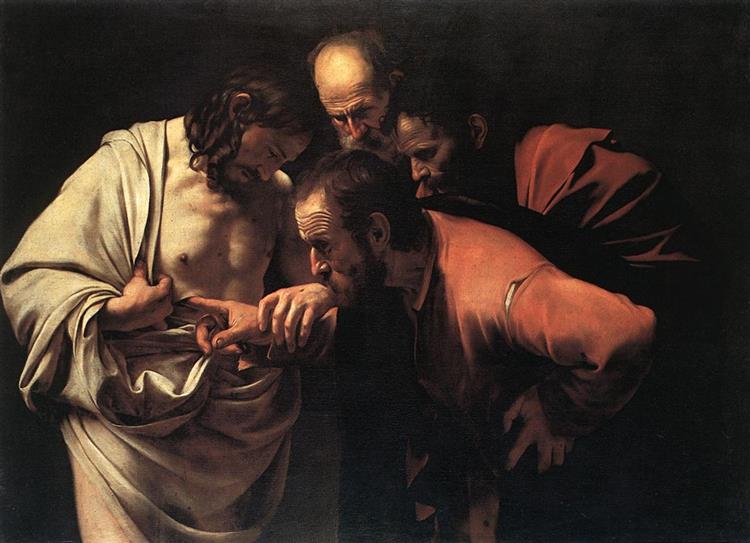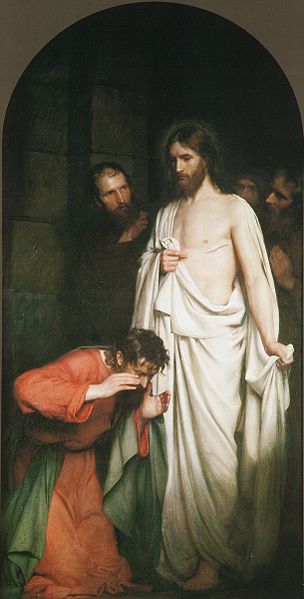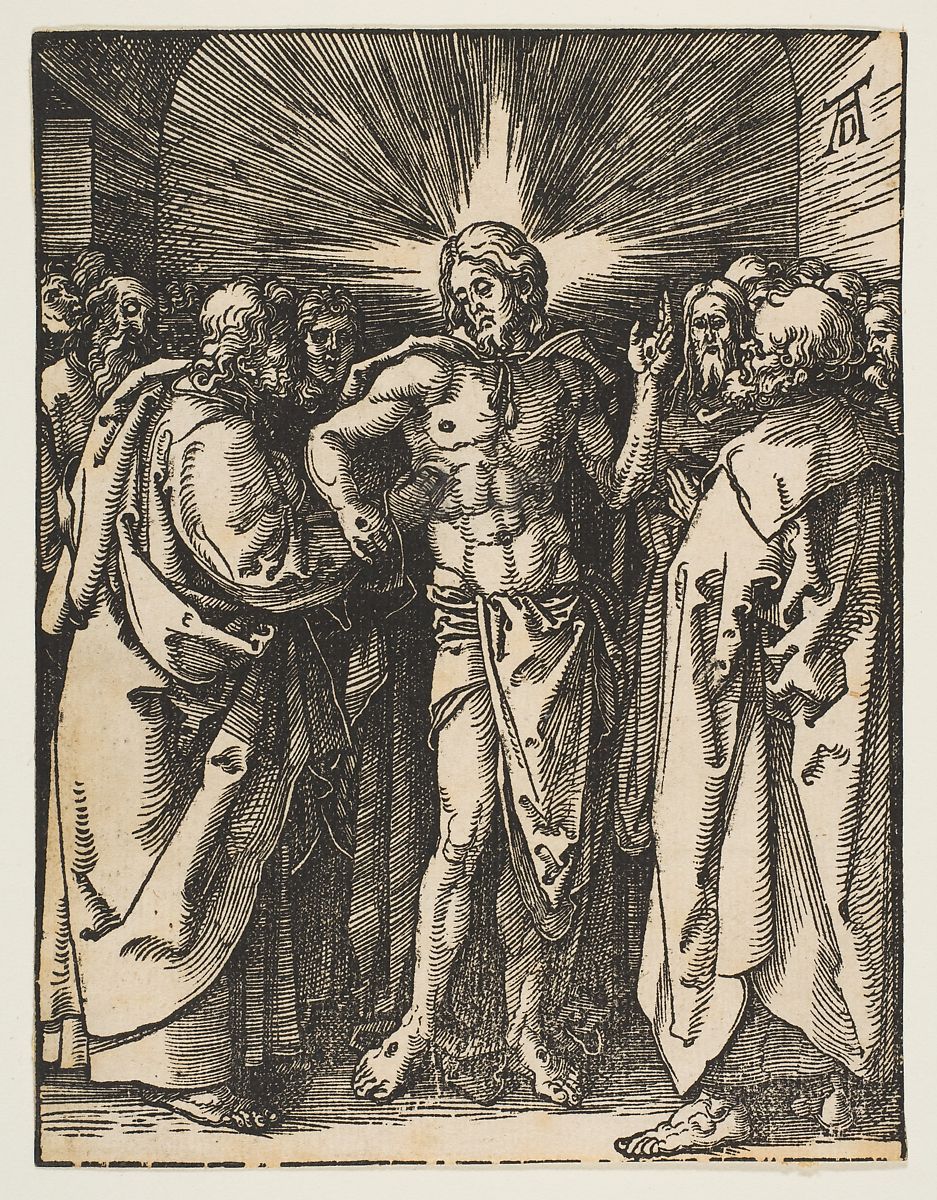John 20:19-31
Pastor James Preus
Trinity Lutheran Church
April 7, 2024
In 1 Timothy 3:15, St. Paul calls the Church the Household of God. Jesus Christ is the Lord of the Church (Hebrews 3:6). When Christ rose from the dead, He did not appear to Pontious Pilate or Caiaphas the chief priest to say, “Hey, look what I did! Boy, were you wrong.” No, Christ appeared to His Church, the household of God, His holy believers and lambs, who gather to listen to His Word. On the Sunday on which He rose from the dead, Christ went to be with His disciples who listen to His Word. He went to be with them the next Sunday as well. And every Sunday since, the Church gathers to hear the Words of Christ and Jesus gathers with them. In our Gospel lesson for this Sunday, we learn about the risen Christ’s activity in His Church on earth.
First, the doors were locked where the disciples were for fear of the Jews, yet Jesus came and stood among them anyway. Jesus is always with His Church. He is her head. She is His body. A head and body cannot be separated from each other but are one flesh. So is Christ with His Church. Wherever the Church is, there is Christ in her midst. This is why He said at the Great Commission before He ascended into heaven, “And behold, I am with you always, even to the end of the age.” (Matthew 28:20) How do we know that Christ is with us? He promises to be where His Word is taught and where His Sacraments are administered. The promise, “I am with you always,” followed His instruction to make disciples, baptizing them, and teaching them. Likewise, Jesus said in Matthew 18, “Wherever two or three are gathered in my name, there am I among them.” We take comfort that when we gather to worship in Christ’s name, hearing His Word and receiving His Sacraments, Christ is with us. When a person is baptized, Christ Himself is there.
But how is He there? Is His divinity there, while His human body is far away? Is he present with His Spirit, but His body is far away from us? No. Christ is here with us, body and soul, flesh and bone! If He is here only as God, then He is not here as our crucified one, which is a terrifying thought. Then He is not here as our Savior! Though we cannot see Him, Christ is with us. This is why we confess that Christ’s body and blood are present in the Sacrament of the Altar. “That’s impossible,” people say. Well, it is also impossible for a man to appear in a locked room, yet there Jesus is, flesh and bones and all.
Christ showed His disciples His hands and His side where the nails and spear left the marks of His crucifixion. This teaches us that in the Church, the crucified and risen Christ is always preached. St. Paul writes in 1 Corinthians 1, “But we preach Christ crucified!” When Christ was raised from the dead, His body was glorified. While remaining human, His body was no longer in a state of humility, but He had entered His exaltation. Yet, the marks of the nails and spear remained in His body, so that He may always be proclaimed as the crucified one. This is the message of the Christian Church for all eternity. Christ Jesus, who was crucified to saves sinners is risen from the dead. All who believe in Him have eternal life.
“Peace be with you,” Jesus said to His disciples. Having paid for the sins of the world, and proven the payment was made by rising from the dead, He proclaims God’s peace to His Church. In the Church of Christ, which is the Household of God on earth, there is constant peace with God, because our sins are forgiven, and we are justified by Jesus’ blood.
“As the Father has sent Me, even so I am sending you,” Jesus told them. By doing this, Christ instituted the Office of the Ministry. The Office of the Ministry is the way by which Christ distributes the fruit of His cross to His Church. “This is how one should regard us, as servants of Christ and stewards of the mysteries of God,” St. Paul writes in 1 Corinthians 4. By dying on the cross, Christ won forgiveness of sins, peace with God, and eternal salvation to all who believe. He has given all this to His Church. Yet, for His lambs to receive what He has won for them, He created this office and put men in it. No one should assume the duties of the Office of the Ministry without a rightly ordered call, as St. Paul writes in Romans 10, “How can they preach unless they are sent.” (vs. 15)
Ministers are stewards. They deal with that which is not theirs. Christ won salvation and He tells His ministers to give it to His people through preaching, teaching, and administering the Sacraments. As Jesus told Peter to feed His sheep, so pastors give to Christ’s sheep what He has prepared for them. This is what St. Paul told the pastors of Ephesus in Acts 20, “Pay careful attention to yourselves and to all the flock, in which the Holy Spirit has made you overseers, to care for the Church of God, which He obtained with His own blood.” (vs. 28)
This is why Jesus said to His disciples, “The one who hears you hears me. The one who rejects you rejects me.” (Luke 10:16) When ministers baptize, forgive sins, administer the Lord’s Supper, and preach God’s Word, the hearers should consider that it is Christ Himself speaking. Faith comes from hearing the Word of Christ. Proclaiming the Word of Christ is the purpose of the Office of the Ministry. Where the Church is, there is the Office of the Ministry with pastors doing the work of their Chief Shepherd.
“Receive the Holy Spirit,” Jesus says. With these words, Jesus teaches us that the Church is the field in which the Holy Spirit works. Those in the Office of the Ministry are charged with proclaiming Christ’s Word and administering Christ’s Sacraments. Through the Word and Sacraments, as through instruments, the Holy Spirit works to create faith where and when it pleases God. This is why we say in the Creed, “I believe in the Holy Spirit, the Holy Christian Church, the Communion of Saints, the forgiveness of sins...” It is within the Holy Christian Church, which is the community of holy people, set apart by God, that the Holy Spirit forgives sins by creating and sustaining faith in the Gospel. When children are baptized, when the pastor absolves sinners, when the Gospel is preached, when the Sacrament of Christ’s body and blood is administered, the Holy Spirit works in the hearts of hearers to believe the promises and receive forgiveness and salvation through faith. On the Last Day, this same Holy Spirit will raise all the dead and give eternal life to all believers in Christ.
“If you forgive the sins of any, they are forgiven them; if you withhold forgiveness from any, it is withheld.” With these words, Jesus gave His Church the Office of the Keys, which is that special authority to forgive the sins of repentant sinners, but to withhold forgiveness from the unrepentant, as long as they do not repent. This is the greatest power on earth. To have your sins forgiven, means that the kingdom of heaven and eternal life is opened to you. To have your sins bound to you because you will not repent, means to have the kingdom of heaven and eternal life closed to you. This tremendous power Christ has given to His Church. So, you should believe that when the minister of Christ, who exercises this power, deals with you by his divine command, in particular when he excludes openly unrepentant sinners from the Christian congregation, and absolves those who repent of their sins and want to do better, this is just as valid and certain even in heaven as if Christ our dear Lord delt with us Himself. While the binding key angers those who cling to their sins, the absolution proclaimed by the pastor grants the believer great comfort and peace knowing that God Himself has forgiven all your sins. The Office of the Keys summarizes the entire mission of the Church, to proclaim God’s wrath against sin, but free forgiveness and salvation to all who repent and believe in the Gospel.
In the Church of Christ, Jesus rebukes unbelief. “Have you believed because you have seen me? Blessed are those who have not seen and yet have believed.” Jesus said to Thomas, who had doubted His resurrection before he saw Him. Yet, this statement about believing without seeing is misunderstood. Many think that this means that faith is just blindly believing something without any witnesses to its truth. They think faith is just trusting your feelings. But saving faith is not trusting your feelings any more than it is trusting your reason or your sight, which corrupted by your sinful nature can lead you astray. You shouldn’t trust your feelings, but the clear Word of God. Scripture says that every truth should be established by two or three witnesses (Deuteronomy 19:15; John 8:17). Thomas sinned, because He did not believe the testimony of the ten disciples, who saw Jesus risen from the dead! He also didn’t believe Jesus’ own words that He would rise from the dead. Saving faith is not simply believing without seeing. Saving faith is believing the trustworthy testimony of Scripture, which is the testimony of the Apostles and Prophets, Christ Jesus Himself as the cornerstone (Ephesians 2:20).
Our faith cannot be compared to that of the Muslims or Mormons, who blindly follow Mohamad or Joseph Smith. Mohamad was one man, who wrote the entire Koran. Joseph Smith likewise was just one man, who claimed that an angel spoke to him and gave him a book. No one else saw what Mohamad and Joseph Smith claimed to have seen. But Jesus’ resurrection was witnessed by hundreds of people, recorded by nearly a dozen more, and predicted by dozens of prophets in the Old Testament. St. John wrote, “These things are written that you may believe that Jesus is the Christ the Son of God and that believing you may have life in His name.” And John’s testimony is not alone. He witnesses with all the Apostles, the women, the five-hundred, and all of Scripture.
So, the Church is not built on feelings. Our faith is founded on the trustworthy testimony of Holy Scripture, written by the Apostles and Prophets, and inspired by the Holy Spirit Himself. John writes, “If we receive the testimony of men, the testimony of God is greater.” Holy Scripture is God’s testimony that Jesus Christ His Son, the crucified and risen one, is our Savior. On this testimony the Church is built.
Finally, Thomas confessed Jesus to be His God and Lord. This is his creed. And it is our creed too. In the Church, we confess the creed in unity. Jesus said, “Whoever confesses Me before men, I too will confess before My Father in heaven.” (Matthew 10:32) And Ephesians 4 states, “There is one body and one Spirit—just as you were called to the one hope that belongs to your call—one Lord, one faith, one baptism.” We confess together the one faith. That is why we confess the creed together today.
All this Christ gave to His Church on earth when He rose from the dead: His abiding presence, the preaching of the Gospel, God’s peace, the Office of the Ministry, the Holy Spirit, the Office of the Keys, the testimony of Holy Scripture, and His approval of the Church’s Creed. For all these reasons, we believe although we do not see Him, that the crucified and risen Lord Jesus, our God and Lord is with us His Church here today. Amen.



 RSS Feed
RSS Feed